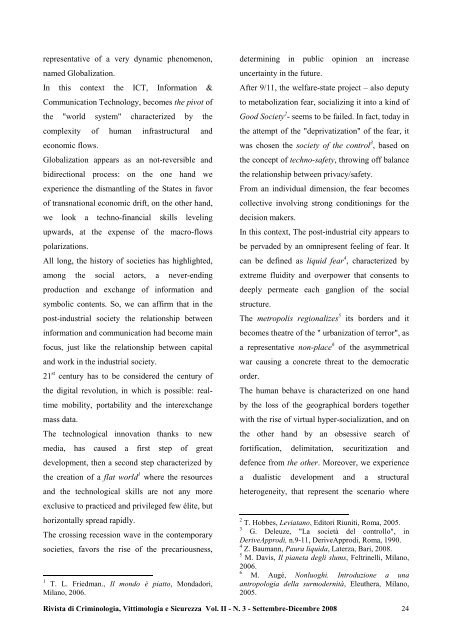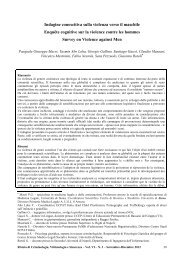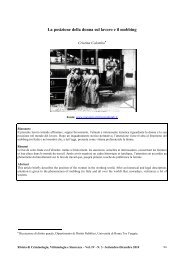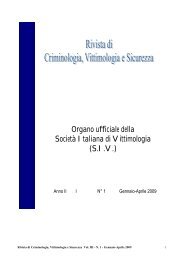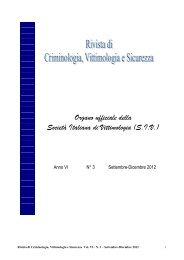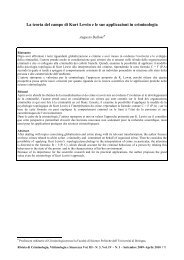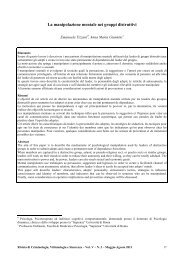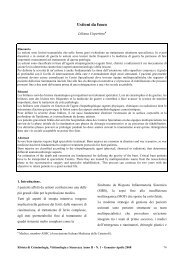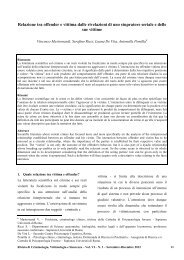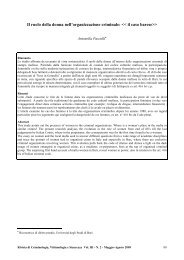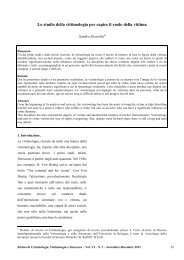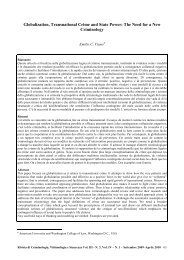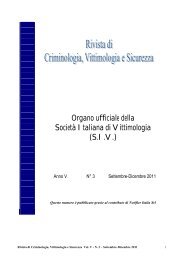Anno 2, Numero 3, Settembre-Dicembre 2008 - Vittimologia
Anno 2, Numero 3, Settembre-Dicembre 2008 - Vittimologia
Anno 2, Numero 3, Settembre-Dicembre 2008 - Vittimologia
You also want an ePaper? Increase the reach of your titles
YUMPU automatically turns print PDFs into web optimized ePapers that Google loves.
epresentative of a very dynamic phenomenon,<br />
named Globalization.<br />
In this context the ICT, Information &<br />
Communication Technology, becomes the pivot of<br />
the "world system" characterized by the<br />
complexity of human infrastructural and<br />
economic flows.<br />
Globalization appears as an not-reversible and<br />
bidirectional process: on the one hand we<br />
experience the dismantling of the States in favor<br />
of transnational economic drift, on the other hand,<br />
we look a techno-financial skills leveling<br />
upwards, at the expense of the macro-flows<br />
polarizations.<br />
All long, the history of societies has highlighted,<br />
among the social actors, a never-ending<br />
production and exchange of information and<br />
symbolic contents. So, we can affirm that in the<br />
post-industrial society the relationship between<br />
information and communication had become main<br />
focus, just like the relationship between capital<br />
and work in the industrial society.<br />
21 st century has to be considered the century of<br />
the digital revolution, in which is possible: real-<br />
time mobility, portability and the interexchange<br />
mass data.<br />
The technological innovation thanks to new<br />
media, has caused a first step of great<br />
development, then a second step characterized by<br />
the creation of a flat world 1 where the resources<br />
and the technological skills are not any more<br />
exclusive to practiced and privileged few élite, but<br />
horizontally spread rapidly.<br />
The crossing recession wave in the contemporary<br />
societies, favors the rise of the precariousness,<br />
1 T. L. Friedman., Il mondo è piatto, Mondadori,<br />
Milano, 2006.<br />
determining in public opinion an increase<br />
uncertainty in the future.<br />
After 9/11, the welfare-state project – also deputy<br />
to metabolization fear, socializing it into a kind of<br />
Good Society 2 - seems to be failed. In fact, today in<br />
the attempt of the "deprivatization" of the fear, it<br />
was chosen the society of the control 3 , based on<br />
the concept of techno-safety, throwing off balance<br />
the relationship between privacy/safety.<br />
From an individual dimension, the fear becomes<br />
collective involving strong conditionings for the<br />
decision makers.<br />
In this context, The post-industrial city appears to<br />
be pervaded by an omnipresent feeling of fear. It<br />
can be defined as liquid fear 4 , characterized by<br />
extreme fluidity and overpower that consents to<br />
deeply permeate each ganglion of the social<br />
structure.<br />
The metropolis regionalizes 5 its borders and it<br />
becomes theatre of the " urbanization of terror", as<br />
a representative non-place 6 of the asymmetrical<br />
war causing a concrete threat to the democratic<br />
order.<br />
The human behave is characterized on one hand<br />
by the loss of the geographical borders together<br />
with the rise of virtual hyper-socialization, and on<br />
the other hand by an obsessive search of<br />
fortification, delimitation, securitization and<br />
defence from the other. Moreover, we experience<br />
a dualistic development and a structural<br />
heterogeneity, that represent the scenario where<br />
2<br />
T. Hobbes, Leviatano, Editori Riuniti, Roma, 2005.<br />
3<br />
G. Deleuze, "La società del controllo", in<br />
DeriveApprodi, n.9-11, DeriveApprodi, Roma, 1990.<br />
4<br />
Z. Baumann, Paura liquida, Laterza, Bari, <strong>2008</strong>.<br />
5<br />
M. Davis, Il pianeta degli slums, Feltrinelli, Milano,<br />
2006.<br />
6<br />
M. Augé, Nonluoghi. Introduzione a una<br />
antropologia della surmodernità, Eleuthera, Milano,<br />
2005.<br />
Rivista di Criminologia, <strong>Vittimologia</strong> e Sicurezza Vol. II - N. 3 - <strong>Settembre</strong>-<strong>Dicembre</strong> <strong>2008</strong> 24


